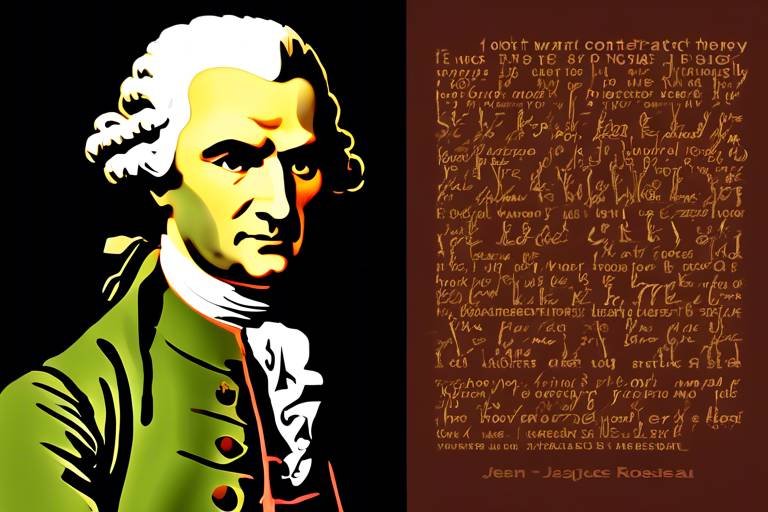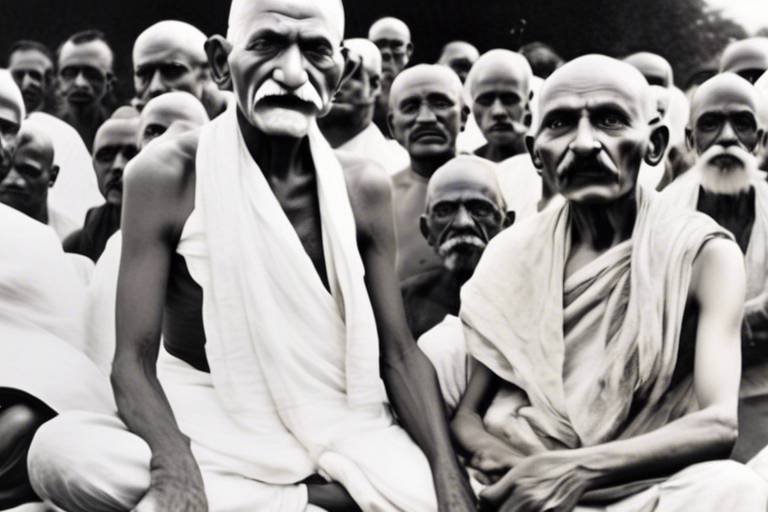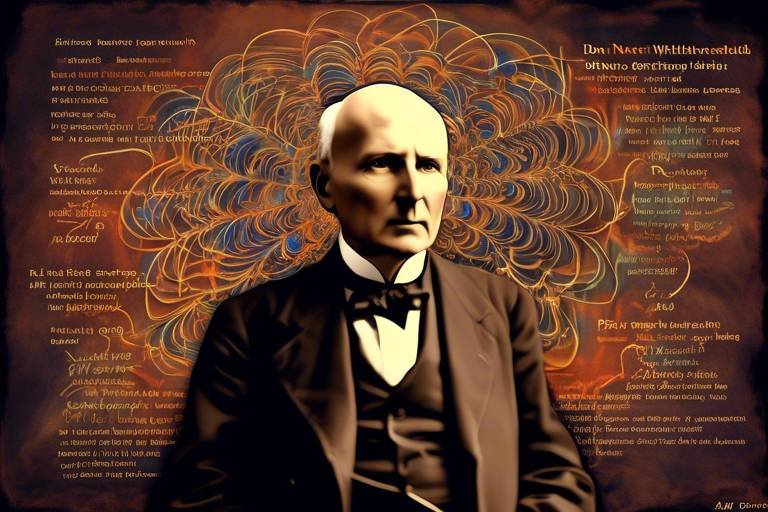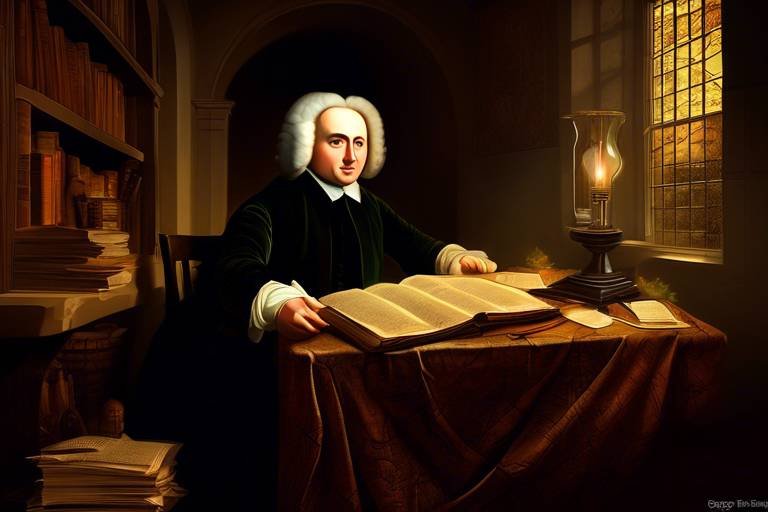Transcendentalism – An Inside Look at Thoreau's Philosophy
Transcendentalism is not just a philosophical movement; it’s a way of seeing the world that encourages us to dig deeper into our own thoughts and feelings. At its core, this philosophy champions the idea that we can find truth and meaning through personal intuition rather than blindly accepting societal norms. Think of it as a call to adventure, where the treasure lies within each of us, waiting to be discovered through introspection and a connection with the natural world.
Henry David Thoreau, one of the most prominent figures of Transcendentalism, lived a life that embodied these principles. His writings reflect a profound respect for nature and a strong belief in the goodness of humanity. He challenged the status quo, urging people to break free from the shackles of conformity and embrace their individuality. In a world that often prioritizes material wealth and societal approval, Thoreau's philosophy serves as a refreshing reminder to look inward and cultivate our own beliefs.
Imagine walking through a forest, the sunlight filtering through the leaves, and feeling an overwhelming sense of peace. This connection to nature is central to Transcendentalism. Thoreau argued that nature is not just a backdrop for our lives; it is a vital teacher, offering lessons about simplicity, beauty, and the interconnectedness of all living things. By immersing ourselves in the natural world, we can gain insights that are often obscured by the noise of modern life.
In his most famous work, Walden, Thoreau documented his experiment in simple living, where he retreated to a cabin in the woods for two years. This journey was not just about escaping society but about discovering the essence of life itself. Thoreau illustrated how solitude can lead to profound personal insights, allowing individuals to reconnect with their true selves and the world around them. His reflections serve as a powerful reminder that sometimes, stepping back is the best way to move forward.
Thoreau’s critique of modern society is another essential aspect of his philosophy. He believed that the relentless pursuit of material wealth and societal approval often leads to a shallow existence. Instead, he advocated for a return to simpler, more meaningful ways of living that align with our true selves and our natural surroundings. His writings challenge us to reconsider what we value and to seek a life rich in purpose and connection.
At the heart of Thoreau's philosophy is the concept of self-reliance. This idea encourages individuals to trust their instincts and beliefs, rather than conforming to the expectations of society. Thoreau's emphasis on self-reliance is a powerful call to action, urging us to cultivate our unique voices and perspectives. In a world that often pressures us to fit in, his message is a beacon of hope, reminding us that our individuality is our greatest asset.
Thoreau's thoughts on civil disobedience further highlight the importance of individual conscience. In his essay, Thoreau argues that it is not only our right but our moral duty to resist unjust laws. This principle has inspired countless social movements, emphasizing the power of peaceful resistance in the pursuit of justice and equality. Thoreau’s advocacy for nonviolent protest serves as a timeless reminder that change often begins with a single voice willing to stand up for what is right.
As we reflect on the legacy of Transcendentalism, it becomes clear that its principles continue to resonate today. In a world increasingly concerned with environmental issues and social justice, Thoreau's message inspires modern movements that advocate for a deeper appreciation of nature and the importance of individualism. His philosophy challenges us to look within, embrace our uniqueness, and strive for a life that is not only fulfilling but also harmonious with the world around us.
- What is Transcendentalism? - Transcendentalism is a philosophical movement that emphasizes personal intuition and the inherent goodness of people and nature.
- Who was Henry David Thoreau? - Thoreau was an American author and philosopher, known for his writings on nature, individualism, and social justice, particularly in his book Walden.
- What is the significance of Walden? - Walden is a reflection on simple living in natural surroundings, illustrating how solitude can lead to personal insights and a deeper connection with the world.
- How did Thoreau influence social movements? - Thoreau's essay on civil disobedience has inspired many social movements, advocating for nonviolent resistance against unjust laws.

The Essence of Transcendentalism
Transcendentalism is not just a philosophical movement; it’s a way of looking at the world that emphasizes the profound connection between humanity and nature. At its core, this philosophy champions the idea that individuals possess an inherent goodness and a unique intuition that should guide their lives. It encourages people to step away from the constraints of society and to embrace their true selves, often leading to a more fulfilling existence. Think of it as a call to return to our roots, to the simple, unadulterated essence of life that many have lost in the hustle and bustle of modernity.
One of the most striking aspects of Transcendentalism is its challenge to traditional societal norms. It pushes against the grain of conformity, urging individuals to trust their instincts and beliefs. This is where the idea of self-reliance comes into play. Imagine standing at a crossroads, with one path leading to the predictable, safe choices dictated by society, and the other leading into the wild unknown of personal exploration. Transcendentalists advocate for the latter, believing that true growth and understanding come from within.
Moreover, Transcendentalism holds a deep appreciation for nature. Thoreau famously stated, "In wildness is the preservation of the world." This belief underscores the idea that nature is not just a backdrop to human life, but a vital source of inspiration and wisdom. Nature teaches us lessons about resilience, interconnectedness, and the cyclical patterns of life. It’s as if every tree, every stream, and every whispering breeze is a reminder that we are part of something much larger than ourselves.
To encapsulate the essence of Transcendentalism, we can consider its key tenets:
- Individual Intuition: Trusting one's instincts over societal expectations.
- Inherent Goodness: A belief in the fundamental goodness of people and nature.
- Self-Reliance: Emphasizing personal independence and self-sufficiency.
- Connection to Nature: Understanding the importance of nature in personal and spiritual growth.
- Critique of Materialism: Challenging the notion that material wealth equates to happiness.
In a world that often prioritizes material success and societal approval, Transcendentalism invites us to pause, reflect, and reconnect with our inner selves and the natural world around us. It’s a philosophy that encourages us to step outside, breathe in the fresh air, and listen to the whispers of the trees. After all, isn’t life more about the journey and the experiences we gather along the way than the possessions we accumulate?

Thoreau’s Life and Influence
Henry David Thoreau was not just a man; he was a philosopher, a naturalist, and a social critic whose influence extends far beyond his own time. Born on July 12, 1817, in Concord, Massachusetts, Thoreau grew up in a world that was rapidly changing due to industrialization. This backdrop of societal transformation played a crucial role in shaping his thoughts and writings. Thoreau was a keen observer of nature and human behavior, and he often found himself at odds with the materialistic values that were becoming prevalent in society.
His education at Harvard University, where he studied a range of subjects including philosophy, science, and literature, equipped him with the tools to articulate his thoughts on individualism and nature. Thoreau was deeply influenced by the works of Ralph Waldo Emerson, who became his mentor and friend. Emerson's ideas on self-reliance and the inherent goodness of nature resonated with Thoreau, fueling his desire to explore these themes in his own writing.
Thoreau’s life was marked by a profound commitment to individual thought and a deep appreciation for the natural world. His famous experiment in simple living at Walden Pond is a testament to his belief in the importance of self-sufficiency and introspection. Here, he lived in a small cabin for two years, seeking to strip away the complexities of modern life and connect with nature. This experience was not just a physical retreat but a spiritual journey that allowed him to reflect on the essence of life.
Throughout his life, Thoreau wrote extensively, producing works that challenged societal norms and encouraged readers to think critically about their relationship with the world around them. His essays and lectures often emphasized the need for individuals to break free from societal constraints and trust their own instincts. In his view, true freedom came from within, and he urged others to seek their own paths rather than blindly following the crowd.
Thoreau's influence can be seen in various movements and ideologies that emerged long after his death in 1862. His advocacy for environmentalism has inspired countless individuals to appreciate and protect the natural world. Moreover, his ideas on civil disobedience have left a lasting legacy in social justice movements, encouraging individuals to stand up against injustice and advocate for change. It’s fascinating to think how a man who lived so simply could have such a profound impact on the modern world.
To understand the depth of Thoreau's influence, we can look at some key aspects:
- Environmentalism: Thoreau’s writings have inspired generations to appreciate and advocate for the preservation of nature.
- Social Justice: His principles of civil disobedience have influenced leaders like Martin Luther King Jr. and Mahatma Gandhi.
- Literature: Thoreau's unique style and profound insights have left an indelible mark on American literature.
In essence, Thoreau's life and philosophy challenge us to reflect on our own lives. Are we living authentically? Are we connected to the natural world? His enduring legacy serves as a reminder that the path to self-discovery and true fulfillment lies in our ability to embrace our individuality and foster a deep connection with nature.
- What is Transcendentalism? Transcendentalism is a philosophical movement that emphasizes the inherent goodness of people and nature, advocating for individual intuition and self-reliance.
- How did Thoreau influence modern environmentalism? Thoreau's writings, especially in "Walden," highlight the importance of nature and the need for its preservation, inspiring modern environmental movements.
- What is the significance of "Civil Disobedience"? Thoreau's essay argues for the moral duty to resist unjust laws, influencing many leaders in civil rights and social justice movements.

Walden: A Reflection on Simplicity
In his seminal work Walden, Henry David Thoreau embarked on an extraordinary journey of self-discovery, immersing himself in the tranquility of nature while living in a small cabin near Walden Pond. This experiment in simple living was not merely a retreat from society; it was a profound statement on the importance of simplicity in a world that often seems overwhelmingly complex. Thoreau's time at Walden was a deliberate choice to strip away the unnecessary distractions of modern life, allowing him to reconnect with his inner self and the natural world around him.
Thoreau believed that by simplifying one’s life, individuals could cultivate a deeper understanding of themselves and their place in the universe. He famously stated, “Our life is frittered away by detail. Simplify, simplify.” This mantra encapsulates his philosophy, urging readers to focus on what truly matters and to eliminate the superfluous. Thoreau's cabin, which he built with his own hands, became a symbol of self-reliance and the pursuit of authenticity. It was in this humble abode that he penned reflections that continue to resonate with those seeking clarity in a chaotic world.
One of the most striking aspects of Walden is Thoreau's ability to draw inspiration from the everyday occurrences of nature. He observed the changing seasons, the behavior of animals, and the simple beauty of the natural landscape, using these experiences to illustrate profound truths about life and existence. Thoreau wrote about the lessons he learned from nature, emphasizing that it is a source of wisdom that teaches us about interconnectedness and the importance of living in harmony with the environment.
Thoreau’s reflections are not just philosophical musings; they are practical lessons that encourage readers to embrace simplicity in their own lives. He challenges us to ask ourselves essential questions: What do we truly need to be happy? How can we cultivate a life that reflects our values? In a society that often equates success with material wealth, Thoreau’s insights serve as a refreshing reminder that true fulfillment comes from within and from our connection to the world around us.
Moreover, Thoreau's experiment at Walden was a critique of the industrialized society that was rapidly emerging in the 19th century. He observed the detrimental effects of materialism and the relentless pursuit of progress, which often led to a disconnection from nature and a loss of individual purpose. By choosing to live deliberately and simply, Thoreau not only sought personal enlightenment but also aimed to inspire others to reconsider their lifestyles and the values that drive them.
In essence, Walden is much more than a memoir of Thoreau's time in the woods; it is a clarion call for a return to simplicity and a deeper appreciation for the natural world. It challenges us to reflect on our own lives and consider how we can incorporate the lessons of nature and simplicity into our daily routines. Thoreau invites us to step back from the noise of modern life and engage with the beauty and wisdom that surrounds us, urging us to find peace in simplicity and joy in the natural world.
- What is the main theme of Walden?
The main theme of Walden is the importance of simple living in natural surroundings, emphasizing self-sufficiency and the pursuit of personal truth. - How did Thoreau's experience at Walden influence his philosophy?
Thoreau's experience at Walden reinforced his belief in individualism, self-reliance, and the need to reconnect with nature. - What lessons can we learn from Thoreau's time at Walden?
We can learn the value of simplicity, the importance of self-reflection, and the need to appreciate the natural world around us.

Walden,
In his groundbreaking work, Walden, Henry David Thoreau takes us on an intimate journey into his life at Walden Pond, where he sought to live deliberately and authentically. Imagine stepping away from the hustle and bustle of modern life, leaving behind the chaos of societal expectations, and immersing yourself in the serene embrace of nature. Thoreau’s experiment in simple living is not just a personal narrative; it’s a profound exploration of what it means to truly exist. He invites us to pause, reflect, and consider the deeper meanings of life, urging us to connect with the world around us.
Thoreau’s time at Walden Pond was marked by a commitment to simplicity, where he minimized distractions to focus on the essentials of life. He famously wrote, “Simplify, simplify.” This mantra echoes throughout his work, challenging us to strip away the excess and embrace a life of purpose. Through his daily routines, Thoreau illustrates how solitude can lead to self-discovery and profound insights. He engaged in activities like farming, reading, and writing, all while observing the natural world. This intentional lifestyle allowed him to cultivate a deep understanding of both himself and the environment.
One of the most striking aspects of Walden is Thoreau’s belief in the transformative power of nature. He describes the beauty of the changing seasons, the sounds of the pond, and the simple joys of living in harmony with the earth. Thoreau sees nature as a teacher, offering lessons about resilience, growth, and interconnectedness. He writes about the importance of being present, urging us to notice the little things that often go overlooked. For Thoreau, every experience in nature is a chance to learn something new about life and ourselves.
Moreover, Thoreau’s critique of modern society shines through in his reflections. He challenges the materialism and conformity that he observed in his contemporaries, advocating for a return to simpler, more meaningful ways of living. He believed that by immersing ourselves in nature and embracing self-reliance, we could find true fulfillment. Thoreau’s insights resonate even today, as many of us grapple with the pressures of modern life and the constant pull of consumerism. His call to simplify and reconnect with nature feels more relevant than ever.
To further understand Thoreau's philosophy, we can break down the key lessons he imparts in Walden into a few essential themes:
- Self-Reflection: Taking time for introspection can lead to greater self-awareness and clarity.
- Connection with Nature: Nature serves as a mirror, reflecting our inner lives and providing solace.
- Embracing Simplicity: Reducing life's complexities can enhance our appreciation for what truly matters.
- Individualism: Trusting oneself and following one's own path is crucial for personal growth.
In essence, Walden is more than just a book; it’s a manifesto for anyone seeking a deeper connection with themselves and the world. Thoreau’s journey at Walden Pond encourages us to question the status quo, to seek out the beauty in simplicity, and to find our own unique paths through life. His reflections remind us that while the world may be filled with distractions, the answers we seek often lie in the quiet moments spent in nature.
- What is the main message of Walden?
The main message of Walden is to live simply and deliberately, emphasizing the importance of self-reliance and a deep connection with nature.
- How did Thoreau's time at Walden Pond influence his philosophy?
Thoreau's time at Walden Pond allowed him to experience the benefits of solitude and simplicity, which greatly influenced his views on individualism and the critique of modern society.
- What lessons does Thoreau learn from nature?
Thoreau learns about resilience, interconnectedness, and the importance of being present through his observations of nature.

Thoreau details his experiment in simple living, illustrating how solitude and nature can lead to profound personal insights and a deeper connection with the world.
In his seminal work Walden, Henry David Thoreau embarked on a remarkable journey of self-discovery by immersing himself in the simplicity of nature. He famously retreated to a small cabin near Walden Pond, seeking to strip away the complexities of modern life. Thoreau's experiment in simple living was not just about physical isolation; it was a profound exploration of the human spirit and its connection to the natural world. Through his time in solitude, he experienced moments of clarity and insight that many of us often overlook in our bustling lives.
Thoreau believed that by simplifying our surroundings, we could better understand ourselves and our place in the universe. He wrote, "Simplify, simplify." This mantra echoed throughout his writings, urging others to discard the unnecessary trappings of society that cloud our judgment and hinder our personal growth. The beauty of nature, with its changing seasons and tranquil landscapes, became his teacher, offering lessons that were both profound and transformative.
During his time at Walden Pond, Thoreau engaged in daily rituals that allowed him to connect deeply with his environment. He observed the migratory patterns of birds, the growth of plants, and the gentle ripples of the water. Each moment spent in nature was a lesson in patience and presence. Thoreau's reflections reveal how these experiences led him to profound realizations about life, purpose, and the interconnectedness of all living things. He discovered that solitude is not merely the absence of company but a rich opportunity for introspection and understanding.
Through his writings, Thoreau encourages readers to embrace solitude and seek their own paths to enlightenment. He illustrates that when we step away from the noise of society, we can hear our inner voice more clearly. This connection to nature fosters a sense of peace and belonging, reminding us that we are part of something larger than ourselves. Thoreau's insights resonate today, urging us to consider how we can apply the principles of simple living in our own lives. By prioritizing what truly matters and nurturing our relationship with the natural world, we can cultivate a deeper sense of fulfillment and purpose.
In essence, Thoreau's experiment at Walden serves as a powerful reminder of the beauty that simplicity can bring. It challenges us to question our own lives and the values we hold dear. Are we too caught up in the chaos of modern existence, or can we find solace in the quiet moments? Thoreau’s legacy continues to inspire those seeking a more meaningful connection with themselves and the world around them.
- What was the purpose of Thoreau's experiment at Walden Pond?
Thoreau aimed to explore simple living and self-sufficiency, seeking a deeper understanding of himself and his relationship with nature. - How did Thoreau’s time in nature influence his philosophy?
His experiences in solitude allowed him to develop profound insights about life, individualism, and the importance of connecting with the natural world. - What can we learn from Thoreau's reflections on simplicity?
Thoreau teaches us that simplifying our lives can lead to greater clarity, purpose, and a stronger connection to both ourselves and nature.

Lessons from Nature
Henry David Thoreau had an extraordinary ability to draw profound lessons from the natural world around him. He believed that nature was not just a backdrop for human existence but a vital teacher, offering wisdom that could lead to personal growth and enlightenment. Imagine wandering through a serene forest or sitting by a tranquil lake; these experiences can evoke a sense of peace and introspection that is hard to find in the chaos of modern life. Thoreau's time spent in nature was more than just a retreat; it was a deliberate choice to engage with the world in a way that fostered understanding and connection.
One of the key lessons Thoreau learned from nature is the idea of interconnectedness. He observed how every element in the ecosystem plays a role, from the smallest insect to the tallest tree. This realization extended beyond the physical realm into the spiritual, where he saw that humans, too, are part of this intricate web of life. By recognizing our connection to nature, we can cultivate a sense of responsibility towards it, understanding that our actions have consequences not just for ourselves, but for the entire planet. Thoreau eloquently expressed this belief, stating, “In wildness is the preservation of the world.”
Moreover, Thoreau emphasized the importance of solitude and reflection. In his writings, he often highlighted how moments spent alone in nature can lead to profound self-discovery. When we step away from the noise of society and immerse ourselves in the natural world, we are given the space to think deeply about our lives, our values, and our purpose. Solitude in nature allows us to shed societal expectations and reconnect with our true selves, much like a river carving its own path through a mountainside.
Thoreau also believed that nature teaches resilience. The changing seasons serve as a metaphor for life's ups and downs. Just as trees shed their leaves in autumn only to bloom again in spring, we too can learn to embrace change and find strength in adversity. This cyclical pattern in nature reminds us that challenges are often temporary and that renewal is always possible. Thoreau’s reflections on nature encourage us to adopt a similar mindset—seeing obstacles as opportunities for growth.
In essence, the lessons from nature that Thoreau articulated are as relevant today as they were in his time. They remind us to slow down, appreciate the beauty around us, and recognize the wisdom that nature has to offer. Whether it's through a walk in the woods, a moment of stillness by a river, or simply observing the stars at night, engaging with nature can lead to invaluable insights about ourselves and our place in the world. Embracing these lessons can pave the way for a more fulfilling, harmonious existence.
- What is Transcendentalism? - Transcendentalism is a philosophical movement that emphasizes the inherent goodness of people and nature, advocating for self-reliance and individual intuition.
- How did Thoreau influence modern environmentalism? - Thoreau's writings about nature and simple living laid the groundwork for modern environmentalism, inspiring movements focused on sustainability and conservation.
- What is the significance of solitude in Thoreau's philosophy? - Solitude is seen as a means of self-discovery and reflection, allowing individuals to connect with their true selves away from societal pressures.
- How can I apply Thoreau's lessons from nature in my daily life? - Spend time outdoors, practice mindfulness, cultivate a sense of interconnectedness with nature, and embrace change as a part of life.

Critique of Modern Society
Henry David Thoreau was not just a man of words; he was a man of action and reflection, challenging the very fabric of the society he lived in. In his writings, Thoreau took a bold stance against the rampant materialism and conformity that characterized the 19th-century American landscape. He believed that society had become so engrossed in the pursuit of wealth and status that it had lost sight of what truly mattered: the individual and their connection to nature.
Thoreau's critique was not merely a complaint; it was a call to arms for individuals to awaken from their slumber of complacency. He argued that the relentless chase for material possessions often leads to a hollow existence. This resonates today, doesn’t it? How many of us find ourselves caught up in a cycle of consumerism, buying things we don’t need with money we don’t have, simply to impress people we don’t even like? Thoreau would challenge us to consider: what do we truly value?
In his seminal work, Walden, Thoreau famously declared, “The mass of men lead lives of quiet desperation.” This poignant observation reflects his belief that many people conform to societal expectations, sacrificing their individuality and true desires in the process. He urged readers to step back and evaluate their lives, to seek simplicity and authenticity rather than the superficial allure of societal approval.
Thoreau’s philosophy can be summarized in a few key critiques of modern society:
- Materialism: The obsession with possessions distracts us from genuine happiness.
- Conformity: Societal norms often stifle individual thought and creativity.
- Disconnection from Nature: Modern life frequently alienates us from the natural world, which is essential for our well-being.
To illustrate his points, Thoreau often drew on the beauty and wisdom found in nature. He believed that by immersing ourselves in the natural world, we could rediscover our true selves and understand our place within the universe. He saw nature as a teacher, offering lessons on patience, resilience, and interconnectedness. In contrast, the chaotic hustle of modern life often leads us astray, drowning out the quiet voice of our conscience.
Moreover, Thoreau’s critique extended to the institutions of his time, including government and education, which he believed perpetuated conformity and suppressed individuality. He challenged the notion that success should be measured by wealth and status, advocating instead for a life rich in experience and personal growth. This idea is particularly relevant today as we navigate a world that often prioritizes profits over people.
In essence, Thoreau's critique of modern society serves as a reminder that we must continually question the status quo. Are we living authentically, or are we merely playing roles dictated by external pressures? His philosophy encourages us to embrace our individuality, to seek deeper connections with both ourselves and the world around us, and to resist the pull of a society that often values conformity over creativity.
- What is Transcendentalism? Transcendentalism is a philosophical movement that emphasizes the inherent goodness of people and nature, advocating for individual intuition and self-reliance.
- How did Thoreau influence modern environmentalism? Thoreau's writings inspired a deep appreciation for nature and the importance of preserving it, serving as a foundation for contemporary environmental movements.
- What is the significance of Thoreau's essay "Civil Disobedience"? In this essay, Thoreau argues for the moral obligation to resist unjust laws, promoting the idea of individual conscience over blind obedience to government authority.

Individualism and Self-Reliance
At the heart of Thoreau's philosophy lies the profound idea of individualism and self-reliance. Thoreau believed that every person possesses an innate wisdom that should be trusted and followed. This concept encourages individuals to look within themselves for guidance rather than blindly adhering to societal norms and expectations. Imagine standing at a crossroads, where one path is paved and well-trodden, while the other is wild and uncharted. Thoreau urges us to take the less traveled path, to embrace our unique journeys, and to cultivate our own beliefs and values.
Thoreau’s emphasis on self-reliance is not merely about independence; it’s about a deep-seated trust in one’s own instincts. He famously stated, “Trust thyself: every heart vibrates to that iron string.” This quote encapsulates the essence of his message. It’s a call to action, urging us to listen to our inner voice and to have the courage to act upon it. In a world filled with distractions and external pressures, this philosophy serves as a refreshing reminder to prioritize our own thoughts and feelings.
In practical terms, self-reliance can manifest in various ways. Here are a few key aspects:
- Personal Responsibility: Taking ownership of one’s choices and actions, rather than blaming circumstances or others.
- Critical Thinking: Questioning mainstream beliefs and developing one’s own opinions based on personal experiences.
- Emotional Independence: Learning to find contentment and happiness from within rather than depending on external validation.
Thoreau also believed that self-reliance fosters a deeper connection with nature. When we strip away the noise of societal expectations, we can truly appreciate the beauty and wisdom that surrounds us. Nature becomes a mirror reflecting our inner selves, teaching us about resilience, adaptability, and the importance of living authentically. Thoreau's time spent at Walden Pond was not just an escape from society; it was a deliberate choice to immerse himself in the natural world and to cultivate a life of simplicity and purpose.
Moreover, Thoreau's philosophy of individualism is a powerful antidote to conformity. In a society that often pressures individuals to fit into predefined molds, Thoreau’s teachings encourage us to celebrate our uniqueness. He believed that true progress can only be achieved when individuals are free to express their thoughts and pursue their passions. This is where the magic happens—when we embrace our individuality, we not only enrich our own lives but also contribute to the tapestry of human experience.
In conclusion, Thoreau's ideas on individualism and self-reliance are as relevant today as they were in the 19th century. They challenge us to break free from societal constraints and to cultivate our own paths. By trusting ourselves and embracing our individuality, we can lead more fulfilling lives and inspire others to do the same. So, the next time you find yourself at a crossroads, remember Thoreau’s wisdom and dare to take the road less traveled.
- What is the main idea of Thoreau's philosophy?
Thoreau's philosophy centers on individualism, self-reliance, and the belief that people should trust their own instincts and connect with nature.
- How does Thoreau define self-reliance?
Self-reliance, according to Thoreau, is about trusting oneself and taking personal responsibility for one’s choices and actions.
- Why is nature important in Thoreau's philosophy?
Thoreau views nature as a source of inspiration and wisdom that teaches valuable lessons about life and self-discovery.

The Role of Civil Disobedience
Henry David Thoreau's essay Civil Disobedience is not just a piece of writing; it's a powerful manifesto that challenges the very fabric of societal norms. Thoreau argues that individuals have a moral obligation to resist unjust laws, essentially placing personal conscience above government authority. This idea is as relevant today as it was in the 19th century. But what does it really mean to practice civil disobedience? It's about standing up for what is right, even when it means going against the grain. Thoreau believed that when a law is unjust, individuals should not only refuse to follow it but also actively protest against it.
Imagine living in a world where you blindly followed rules that contradicted your values. Thoreau paints a vivid picture of the struggle between individual morality and societal expectations. He was deeply influenced by the injustices of his time, particularly slavery and the Mexican-American War. In his view, compliance with such laws was tantamount to complicity. This notion resonates with many modern movements that seek justice and equality, demonstrating the timelessness of Thoreau's thoughts.
Thoreau's argument is not just theoretical; it’s rooted in a profound ethical framework. He believed that true justice cannot be achieved through passive acceptance of wrongs. Instead, he urged individuals to act, to engage in nonviolent resistance as a means of enacting change. This approach has inspired countless activists and social movements throughout history. From the Civil Rights Movement to contemporary environmental protests, Thoreau's influence can be seen in the strategies employed by those who seek to challenge the status quo.
To better understand Thoreau's philosophy on civil disobedience, consider the following key points:
- Personal Conscience: Thoreau emphasized the importance of individual moral judgment over societal norms.
- Nonviolent Resistance: He advocated for peaceful protest as a means of enacting change.
- Active Participation: Thoreau believed that individuals should not remain passive in the face of injustice.
Thoreau's call to action is a reminder that the fight for justice often requires courage and conviction. It encourages us to reflect on our own beliefs and the laws we abide by. Are they just? Do they align with our values? In a world filled with complexities, Thoreau's insights serve as a beacon for those willing to challenge the status quo and advocate for change.
- What is civil disobedience? Civil disobedience is the active, professed refusal to obey certain laws, demands, or commands of a government or occupying power, often through nonviolent means.
- How did Thoreau's views on civil disobedience influence modern movements? Thoreau's emphasis on individual conscience and nonviolent resistance has inspired many social justice movements, including the Civil Rights Movement and contemporary environmental activism.
- Why is civil disobedience important? It highlights the need for individuals to stand up against injustice and promotes the idea that laws should reflect moral values.

Civil Disobedience
is not just a term; it's a powerful call to action that resonates deeply within the fabric of society. In his seminal essay, Thoreau encourages individuals to stand up against injustice, arguing that it is not only a right but a moral imperative to resist laws that are unjust. His philosophy pushes us to question: Are we merely cogs in a machine, or do we have the responsibility to challenge the status quo when it fails to uphold justice?
Thoreau believed that the government, while essential for societal order, could often become a vehicle for oppression. He famously stated, “That government is best which governs least,” suggesting that excessive governmental control stifles individual freedom and conscience. This idea challenges us to reflect on our own relationship with authority. Are we passive observers, or do we actively engage with the principles that govern us?
In his essay, Thoreau outlines several key principles of civil disobedience, including:
- Individual Conscience: The belief that personal moral judgment should guide one's actions, even in defiance of laws.
- Nonviolent Resistance: Advocating for peaceful protest as a means of enacting change, emphasizing that violence only begets more violence.
- Social Responsibility: The idea that individuals have a duty to challenge injustices in society, regardless of the potential consequences.
Thoreau's ideas have had a profound impact on numerous social movements throughout history. His call for nonviolent protest inspired leaders like Martin Luther King Jr. and Mahatma Gandhi, who echoed his sentiments in their own struggles for civil rights and independence. This highlights an essential truth: the fight for justice is often rooted in the courage to stand alone, to speak out against the tide of conformity, and to act according to one's convictions.
As we navigate our own societal challenges today, Thoreau's philosophy remains relevant. It urges us to consider how we can engage in civil disobedience in our own lives. Are there laws we believe are unjust? How can we express our dissent without resorting to violence? These questions are crucial as we strive for a more just and equitable society.
In essence, civil disobedience is not merely about breaking laws; it’s about fostering a culture of ethical responsibility and moral courage. It encourages us to embrace our individuality and to use our voices as instruments of change. Thoreau's legacy teaches us that true progress often comes from those who dare to defy the norm and advocate for what is right, reminding us that the path to justice is paved with the actions of the brave.
- What is civil disobedience? Civil disobedience is the active, professed refusal to obey certain laws, demands, and commands of a government, typically on the grounds of moral or ethical objections.
- How did Thoreau influence modern movements? Thoreau's philosophy of nonviolent resistance has inspired many leaders in civil rights movements, urging individuals to stand against injustice peacefully.
- Why is individual conscience important in civil disobedience? Individual conscience is crucial as it guides a person's decisions and actions in the face of unjust laws, emphasizing the moral responsibility to act according to one's beliefs.

argues for the moral imperative to resist unjust laws, emphasizing the importance of individual conscience in the face of government authority.
Transcendentalism emphasizes the importance of personal intuition and the inherent goodness of people and nature, challenging traditional societal norms and promoting self-reliance.
Henry David Thoreau's experiences and personal philosophy shaped his writings, making him a central figure in the Transcendentalist movement and an advocate for individual thought and nature appreciation.
In Walden, Thoreau details his experiment in simple living, illustrating how solitude and nature can lead to profound personal insights and a deeper connection with the world.
Thoreau believed that nature was a source of inspiration and wisdom, teaching valuable lessons about life, self-discovery, and the interconnectedness of all living things.
Thoreau's writings often critique the materialism and conformity of his time, advocating for a return to simpler, more meaningful ways of living in harmony with nature.
Central to Thoreau's philosophy is the idea of self-reliance, which encourages individuals to trust their instincts and beliefs rather than conforming to societal expectations.
Thoreau's essay Civil Disobedience argues for the moral imperative to resist unjust laws, emphasizing the importance of individual conscience in the face of government authority. He believed that it is not only the right but the duty of individuals to stand against laws that they perceive as unjust. In a society where laws may serve the interests of a select few rather than the common good, Thoreau posited that individuals must listen to their inner moral compass, even when it goes against the grain of societal norms.
Thoreau famously stated, “Any man more right than his neighbors constitutes a majority of one.” This powerful assertion encapsulates the essence of his argument: that personal integrity and ethical judgment should take precedence over blind obedience to the law. He argued that when government actions contradict one’s moral beliefs, individuals must act according to their conscience, even if it means facing punishment or societal backlash.
To illustrate his points, Thoreau used examples from his own life, including his refusal to pay a poll tax that funded the Mexican-American War, which he vehemently opposed. His act of civil disobedience was not just a personal protest; it was a call to others to awaken their moral sensibilities and question the status quo. Thoreau’s philosophy of resistance is rooted in the belief that true justice arises from the collective conscience of individuals who dare to challenge oppressive systems.
Thoreau's advocacy for nonviolent protest has influenced countless social movements, highlighting the power of peaceful resistance in the pursuit of justice and equality.
The principles of Transcendentalism continue to resonate today, inspiring modern environmentalism, social justice movements, and a renewed appreciation for individualism and nature.
- What is Transcendentalism?
Transcendentalism is a philosophical movement that emphasizes the inherent goodness of people and nature, advocating for personal intuition and self-reliance.
- Who was Henry David Thoreau?
Henry David Thoreau was an American essayist, poet, and philosopher, best known for his book Walden and his essay Civil Disobedience.
- What is the main idea of Civil Disobedience?
The main idea is that individuals should resist unjust laws and act according to their moral beliefs, even if it means facing consequences.

Ethics of Nonviolent Resistance
Henry David Thoreau's philosophy of nonviolent resistance is not just a mere suggestion; it is a profound moral stance that challenges the very fabric of societal norms. Thoreau believed that individuals have a moral duty to resist unjust laws, a sentiment that resonates deeply in today’s world. His essay, Civil Disobedience, serves as a rallying cry for those who seek to challenge authority without resorting to violence. But what does it really mean to engage in nonviolent resistance?
At its core, nonviolent resistance is about more than just peaceful protest. It embodies a philosophy that emphasizes the power of the individual conscience. Thoreau argued that individuals should not blindly follow laws that conflict with their moral beliefs. Instead, they should act according to their principles, even if it means facing legal repercussions. This notion draws a clear line between obedience to authority and moral integrity.
Thoreau's approach can be likened to a river flowing steadily around obstacles rather than crashing against them. Just as water finds its way through the toughest terrains, nonviolent resistance seeks to navigate the complexities of injustice with grace and determination. This method not only preserves the dignity of the protester but also invites dialogue and reflection from those in power. By refusing to resort to violence, Thoreau believed that individuals could expose the moral failings of unjust laws without perpetuating a cycle of violence.
The impact of Thoreau's ideas can be seen in various social movements throughout history. Leaders like Mahatma Gandhi and Martin Luther King Jr. drew inspiration from Thoreau's principles, employing nonviolent strategies to fight against oppression and inequality. Their successes demonstrate that nonviolent resistance can be a powerful tool for social change. To illustrate this, consider the following table that highlights key figures influenced by Thoreau's philosophy:
| Leader | Movement | Key Principle |
|---|---|---|
| Mahatma Gandhi | Indian Independence | Satyagraha (truth force) |
| Martin Luther King Jr. | Civil Rights Movement | Love and nonviolence |
| Nelson Mandela | Apartheid Resistance | Reconciliation and peace |
In conclusion, Thoreau's ethics of nonviolent resistance present a compelling argument for the power of peaceful protest. It encourages individuals to stand firm in their beliefs while promoting a culture of dialogue and understanding. As we navigate the complexities of modern society, Thoreau’s teachings remind us that true change often comes not from confrontation but from the courage to act according to our conscience.
- What is nonviolent resistance? Nonviolent resistance is a method of protest that seeks to achieve social or political change without using violence.
- How did Thoreau influence modern social movements? Thoreau's philosophy of civil disobedience inspired leaders like Gandhi and King, who applied his principles in their struggles for justice.
- Why is individual conscience important in nonviolent resistance? Individual conscience serves as a guiding force that motivates people to challenge unjust laws and practices based on their moral beliefs.

Legacy of Transcendentalism
Transcendentalism, a philosophical movement that emerged in the early 19th century, has left an indelible mark on various aspects of modern thought and culture. Its core principles, championed by figures like Henry David Thoreau, continue to inspire contemporary discussions about individualism, nature, and social justice. As we navigate through the complexities of modern life, the teachings of Transcendentalism serve as a guiding light, encouraging us to seek authenticity and connection in our daily lives.
One of the most significant legacies of Transcendentalism is its profound impact on the environmental movement. Thoreau's deep appreciation for nature, as articulated in his seminal work Walden, resonates with today's environmentalists who advocate for sustainable living and a harmonious relationship with the earth. The idea that nature is not merely a resource to exploit but a vital force that nurtures our souls has become a cornerstone of modern ecological thought.
Furthermore, the emphasis on self-reliance and personal intuition has permeated various social justice movements. Activists today draw inspiration from Thoreau's call for individuals to trust their inner moral compass. This has led to a resurgence of grassroots movements that prioritize authenticity over conformity. In a world that often pressures us to fit into predefined molds, the Transcendentalist belief in the inherent goodness of individuals empowers people to stand up against injustice and advocate for change.
To illustrate the enduring influence of Transcendentalism, consider the following table that highlights key areas where its principles have been integrated into modern movements:
| Area | Influence |
|---|---|
| Environmentalism | Focus on sustainability and preservation of nature, echoing Thoreau's ideals. |
| Social Justice | Encourages individuals to resist oppression and advocate for equality. |
| Education | Promotes experiential learning and the importance of nurturing creativity. |
| Spirituality | Emphasizes personal connections to the divine and the importance of self-discovery. |
Moreover, the legacy of Transcendentalism extends into the realm of literature and art. Many contemporary writers and artists draw upon the themes of nature, individualism, and spirituality that are deeply rooted in Transcendentalist thought. The movement has paved the way for a more introspective and meaningful approach to creativity, urging artists to explore their own experiences and emotions as a source of inspiration.
In conclusion, the legacy of Transcendentalism is not just a relic of the past; it is a living philosophy that continues to shape our understanding of the world. As we face challenges in our personal lives and society at large, the teachings of Thoreau and his contemporaries remind us of the importance of self-discovery, nature appreciation, and the courage to stand up for what we believe in. By embracing these principles, we can foster a more compassionate and connected world.
- What is Transcendentalism?
Transcendentalism is a philosophical movement that emphasizes the inherent goodness of people and nature, advocating for self-reliance and individual intuition. - Who was Henry David Thoreau?
Henry David Thoreau was an American essayist, poet, and philosopher, best known for his book Walden and his essay Civil Disobedience. - How does Transcendentalism influence modern environmentalism?
Transcendentalism encourages a profound respect for nature, advocating for sustainability and a harmonious relationship with the earth. - What role does individualism play in Transcendentalism?
Individualism is central to Transcendentalism, promoting the idea that individuals should trust their instincts and beliefs over societal expectations.
Frequently Asked Questions
- What is Transcendentalism?
Transcendentalism is a philosophical movement that emphasizes the importance of personal intuition and the inherent goodness of people and nature. It challenges traditional societal norms and promotes self-reliance, encouraging individuals to trust their instincts and beliefs.
- Who was Henry David Thoreau?
Henry David Thoreau was an American essayist, poet, and philosopher, best known for his work in the Transcendentalist movement. His experiences and personal philosophy shaped his writings, making him a central figure advocating for individual thought and a deep appreciation for nature.
- What is the main theme of Walden?
In Walden, Thoreau details his experiment in simple living, illustrating how solitude and nature can lead to profound personal insights. The book emphasizes the value of simplicity and the lessons one can learn from a close relationship with the natural world.
- How did Thoreau view nature?
Thoreau believed that nature was a source of inspiration and wisdom, teaching valuable lessons about life, self-discovery, and the interconnectedness of all living things. He saw nature as essential for personal growth and understanding.
- What does Thoreau critique about modern society?
Thoreau's writings often critique the materialism and conformity of his time, advocating for a return to simpler, more meaningful ways of living. He encouraged individuals to break free from societal expectations and reconnect with nature.
- What is the concept of self-reliance in Thoreau's philosophy?
Self-reliance is a central theme in Thoreau's philosophy, urging individuals to trust their instincts and beliefs rather than conforming to societal pressures. He believed that true fulfillment comes from within and that each person should follow their own path.
- What is the significance of Civil Disobedience?
Thoreau's essay Civil Disobedience argues for the moral imperative to resist unjust laws. It emphasizes the importance of individual conscience in standing up against government authority and has inspired many social movements advocating for justice.
- How has Thoreau's philosophy influenced modern movements?
The principles of Transcendentalism continue to resonate today, inspiring modern environmentalism, social justice movements, and a renewed appreciation for individualism and nature. Thoreau's advocacy for nonviolent resistance has left a lasting legacy.



















